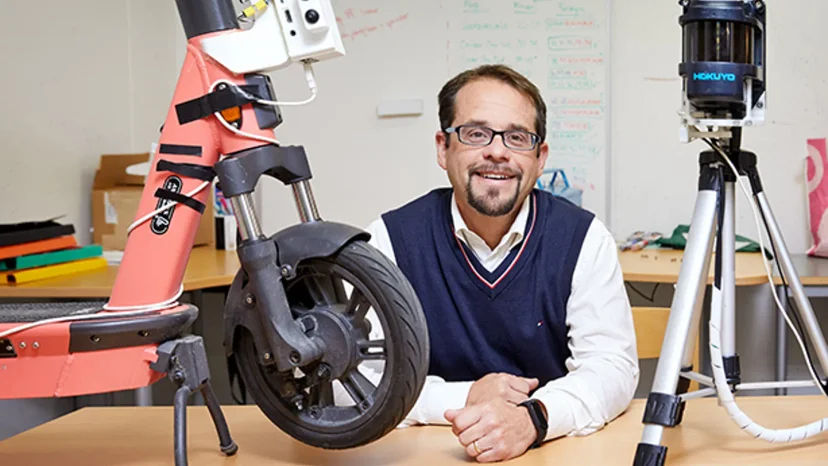Marco Dozza will cycle from Gothenburg to Bologna
"I want to reach out to society and stakeholders to show how research into micromobility can create consensus and improve safety", says Marco Dozza, who will take his bicycle for a ride from Gothenburg to Bologna in 16 days.
1900 km by bike in 16 days. That is what awaits Marco Dozza, professor at Chalmers University of Technology, when he sets out on the Gothenburg-Bologna route. The aim is to collect data on road safety, and to hold presentations along the route through Europe. The trip, and study, is partly funded through SAFER's pre-study program.
"Each presentation will be completely unique, where I present, among other things, the data I have collected on the last part of my route", says Marco Dozza.
Marco Dozza is a professor at the Department of Mechanics and Maritime Sciences, and has focused his research on safety related to so-called micromobility. Micromobility refers to small light vehicles that are usually driven in speeds below 25 km per hour, such as bicycles and the one of the big trends throughout recent years: electric scooters.
"Micromobility is flourishing and gives us opportunities such as improving our mobility and reducing the carbon footprint of our transport", he says. "But today it is poorly integrated into our transport systems. The aim of doing this is reach out to society and stakeholders to show how research around micromobility can create consensus and improve safety."
The bike of the future
Marcos Dozza's bike is equipped with measuring equipment, and during each stage of his trip he will collect research data. In addition to GPS and kinematics, the data collection includes videos from cameras that look around the bike. It will also include data from the bike's so-called CAN bus. CAN buses are used in vehicles so that different control units can communicate with each other. In cars, it can be anti-collision systems, anti-lock brakes and anti-skid systems.
"Today, very few bicycles have a CAN bus, but it is the future and it will enable the development of active safety applications", says Marco Dozza. "For example, the bike I use has an anti-lock braking system. From the camera data, we will calculate the position and kinematics of the surrounding vehicles."
Previous research on micromobility and safety has shown, among other things, that overtaking is probably the deadliest form of accident involving bicycles, and that electric scooters have been reported to increase the risk of crashing ten times compared to bicycles. However, a problem with that kind of research results can be that it leads to bans.
Bans limit progress
"Bans are effective, cheap and quick to implement, but they can also limit progress and reduce the opportunities to develop new green transport solutions", says Marco Dozza. "Less drastic alternatives to bans require multi-stakeholder agreements, which are difficult to achieve as long as the different stakeholders see the problems in different ways. Research results can promote both consensus among stakeholders and data-driven solutions that increase safety."
Currently, researchers know very little about the roots of the safety problems, i.e. the crash mechanisms that make micromobility unsafe. Data collected as road users go about their daily routines can help show why micromobility crashes occur.
"It can create the basis for solutions that include progress and technology to improve the safety and mobility of all road users, solutions which are acceptable to all stakeholders", says Marco Dozza.
Raise awareness about road safety
The journey starts in Gothenburg on 11 June, and after a stop in Halmstad, continues through Denmark and Germany, over the Alps, to reach Bologna on 26 June. Marco Dozza hopes to reach out to thousands of people outside the academic world, to have the opportunity to make them more aware of the results of road safety research, and in the long run, perhaps to be able to make them avoid some crashes in the future. But of course he sees challenges with the project.
"The logistics are tight, the equipment complex, the elements unpredictable – a lot can happen and challenge the project's success, but with a little bit of luck I will collect an unprecedented data set from across Europe showing how drivers overtake cyclists. The dataset will contribute to the development of next-generation intelligent systems, such as automatic braking. Finally, this project will contribute to more informed policy decision-making at EU level by providing data on lateral distances and highlighting the role of infrastructure design in overtaking strategies."
More information
Micromobility safety - the website of the project
Follow Marco Dozza on Instgram
Two playlists on Youtube
https://www.youtube.com/playlist?list=PL4J_y4nKehcPqJ0rHpEPEJxrD98LH0TIq
https://www.youtube.com/playlist?list=PL4J_y4nKehcOlJ1y_w-HpbYARlY_hizPV
Author of this text: Robert Karlsson, Chalmers University
